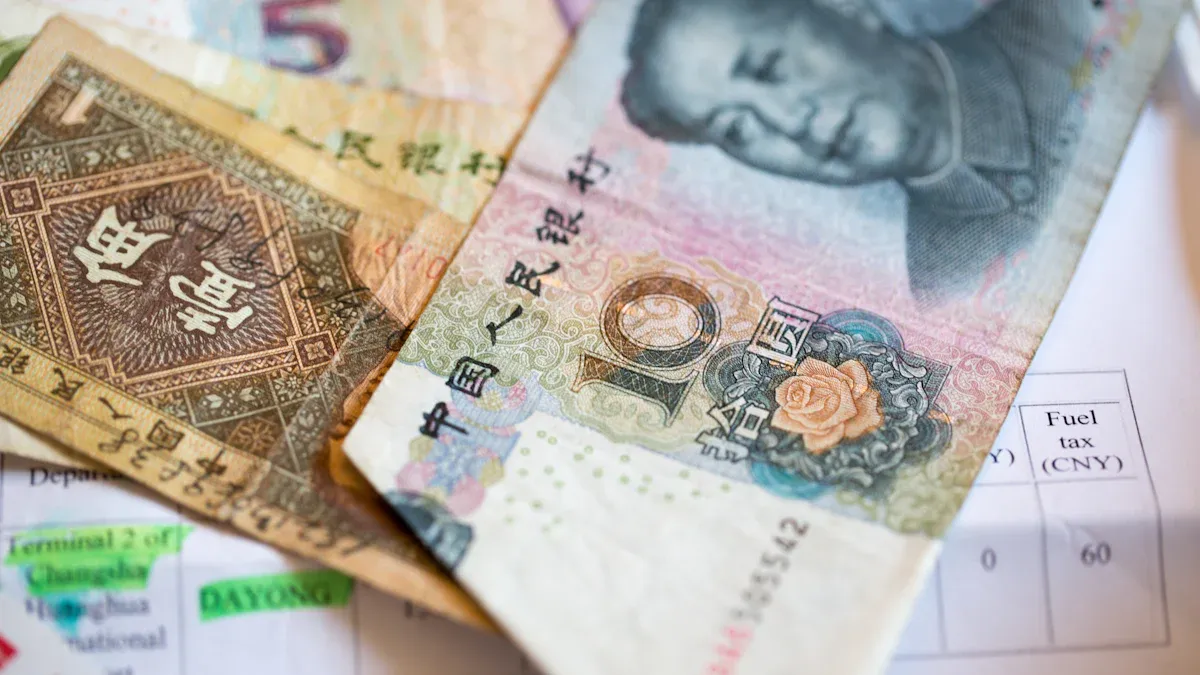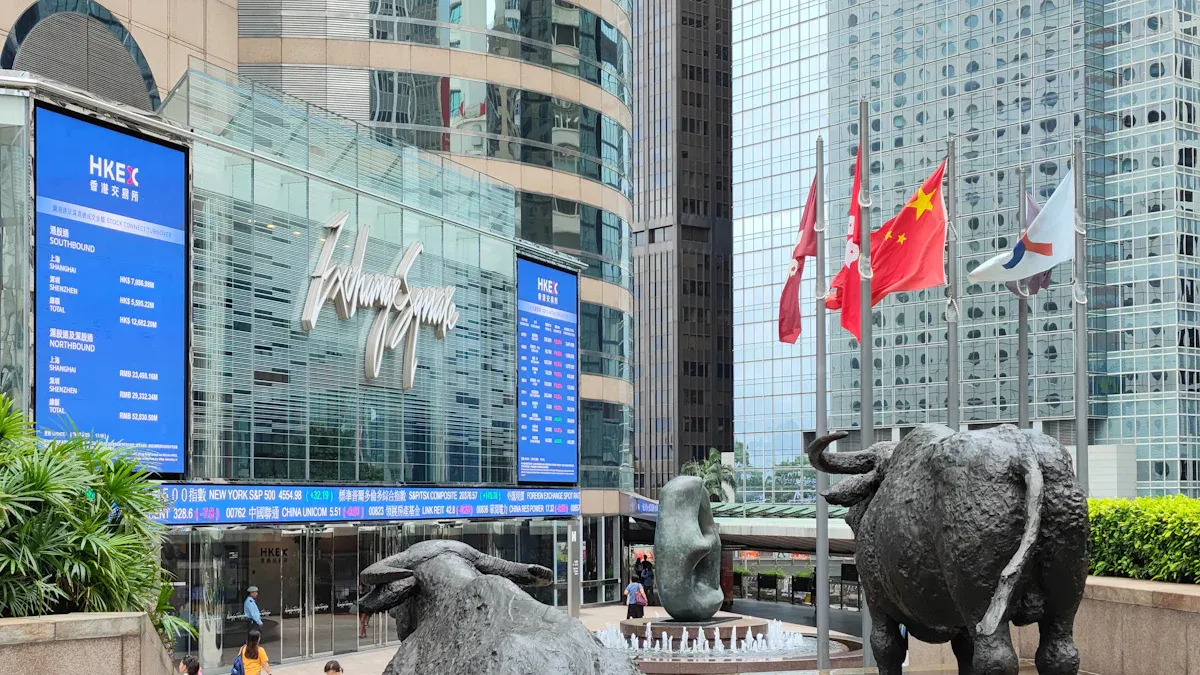- EasyCard
- Trade
- Help
- Announcement
- Academy
- SWIFT Code
- Iban Number
- Referral
- Customer Service
- Blog
- Creator
How to Exchange CNY Most Cost-Effectively for Travel to China? A Must-Read for Hong Kong Travelers

Image Source: unsplash
When traveling to China, you want to know the most cost-effective way to exchange CNY. According to the latest data, exchange shops usually offer better rates than Hong Kong banks, and most are fee-free, making them particularly suitable for large-amount exchanges. The table below compares the costs and suitable groups for different exchange methods:
| Exchange Method | Rate Advantage | Fees (USD) | Suitable For | Notes |
|---|---|---|---|---|
| Hong Kong Banks | Medium-Low | 2.5-6.5 | Small-amount exchange | Lower rates, requires appointment |
| Exchange Shops | Highest | No fees | Large-amount exchange | Significantly better rates, choose licensed shops |
| ATM Withdrawal | Medium | 1.5-2% | Urgent cash needs | Daily limit of about 20,000 CNY |
| Digital Wallets | Medium | 0.5-1% | Small online payments | Requires linking to a mainland account |
You should pay attention to the differences in CNY to HKD exchange rates and fees, as well as the limits and safety risks of carrying cash and using digital payments.
Key Points
- Exchange shops in Hong Kong offer better CNY exchange rates than banks, and most are fee-free, making them suitable for large cash exchanges.
- When carrying CNY cash into China, the limit is 20,000 CNY; amounts exceeding this must be declared to avoid fines or confiscation.
- Using digital payments like Alipay or WeChat Pay Hong Kong wallets is convenient and fast, suitable for small transactions without needing a mainland bank account.
- When exchanging CNY, choose licensed legitimate exchange shops and keep transaction receipts to ensure fund safety.
- ATM withdrawals are suitable for urgent cash needs, but there are daily withdrawal limits and higher fees; count cash immediately after withdrawal.
Most Cost-Effective Exchange Methods
Recommended Exchange Shops
If you want to exchange cash at the most favorable CNY to HKD rate, Hong Kong exchange shops are usually the best choice. You can find many well-known exchange shops in areas like Tsim Sha Tsui, Mong Kok, and Central, such as Kin Shing, Ngau Kee, and Fat Tat Bird. These shops generally offer better rates than Hong Kong banks and most do not charge fees. For large cash exchanges, exchange shops provide more flexible services, allowing you to obtain cash immediately.
Before going to an exchange shop, it’s recommended to use online rate comparison tools to check the CNY to HKD rates of different shops. You can call the shops directly to inquire about the same-day rates, as rates fluctuate with the market. When exchanging, choose licensed legitimate shops to reduce the risk of receiving counterfeit notes. After completing the transaction, remember to ask for a receipt for future reference.
Tip: When exchanging amounts exceeding USD 10,000, some shops may require identification. Prepare relevant documents in advance.
Bank Exchange
If you prioritize safety and stability, you can choose to exchange CNY at Hong Kong banks. The CNY to HKD exchange rates at banks are usually slightly lower than those at exchange shops, and they charge fees of USD 2.5-6.5. For small cash exchanges, banks are a safer option. You can book an exchange through online banking or at a branch, and some banks offer same-day exchange services.
Note that when exchanging over USD 10,000 (approximately 80,000 CNY), banks will require you to declare the purpose of the funds. This is in accordance with Hong Kong’s financial regulations to prevent money laundering. As long as you fill out the declaration form truthfully, banks will generally process it smoothly.
Be mindful of bank operating hours, as some branches only provide exchange services during business hours. If you need cash urgently, banks may not be able to process immediately. Consider checking the CNY to HKD rates on the bank’s website before deciding whether to proceed.
Note: For large cash exchanges, banks have stricter review procedures. Allow extra time for processing.
CNY to HKD Exchange Rate Comparison

Image Source: unsplash
When exchanging CNY, your primary concern is the CNY to HKD exchange rate. Different exchange methods affect the actual amount you receive. Learn to compare various methods to choose the one that suits you best.
Exchange Shop Rates
Choosing exchange shops to exchange CNY typically offers more favorable CNY to HKD rates. Exchange shops in popular Hong Kong areas like Mong Kok, Tsim Sha Tsui, and Central often provide better rates than banks. For large cash exchanges, the rate advantage of exchange shops is more pronounced.
You can use online rate comparison tools like MoneyHero or OpenRice Money to compare CNY to HKD rates across different shops in real time. Calling shops to check same-day rates can help avoid losses due to market fluctuations.
For small exchanges, exchange shops are also convenient and fast, requiring no appointments, suitable for those needing cash urgently. However, choose licensed shops to ensure transaction safety.
Tip: For larger exchange amounts, check and book in advance to avoid insufficient cash on-site.
Bank Rates
If you choose to exchange CNY at Hong Kong banks, you’ll find the CNY to HKD rates generally lower than those at exchange shops. Banks charge fees of USD 2.5-6.5, reducing the actual amount received for small exchanges.
You can check real-time rates through online banking or mobile apps. Some banks, like iFAST Global Bank, offer better rates and lower fees for small transactions, with fast processing, suitable for urgent small CNY needs.
You can also consider international remittance platforms like Wise, which offer transparent rates, fees typically below 1%, and simple operations, ideal for small exchanges or online payments.
For online banking, like E.Sun Bank’s online banking program, you can handle small exchanges 24/7 with rate discounts, making it convenient and cost-effective.
Note: For exchanges exceeding USD 10,000, banks require you to declare the purpose of the funds; allow time for processing.
ATM and Digital Payment Rates
When withdrawing cash from ATMs in China, the CNY to HKD rate fluctuates based on the issuing bank and the daily rate. Each withdrawal incurs a 1.5-2% fee, suitable for urgent cash needs. Note the daily withdrawal limit of about 20,000 CNY, beyond which withdrawals are denied.
If you use digital payment tools like Alipay or WeChat Pay, after activating a Hong Kong wallet, you can spend in CNY directly. These platforms’ CNY to HKD rates are generally similar to banks, with lower fees, suitable for daily small transactions.
You can also consider digital banks or international remittance platforms like Wise or iFAST, which offer better CNY to HKD rates for small transactions, low fees, and fast transfers, ideal for online shopping or payments.
- Digital banks like iFAST Global Bank and international remittance platforms like Wise offer better rates and lower fees, especially for small transactions.
- Wise offers transparent rates, fees below 1%, supports multiple currencies, and is easy to use.
- E.Sun Bank’s online banking program allows 24/7 small exchanges with rate discounts.
When exchanging CNY, use online rate comparison tools to stay updated on the latest CNY to HKD rates. Choose the most suitable method based on your needs.
Choosing Exchange Methods
Cash Exchange
If you prefer cash, both Hong Kong exchange shops and banks allow you to exchange CNY. At exchange shops, you can usually get cash immediately with better rates and lower fees than banks. At banks, safety is higher, but rates are lower, with fees of about USD 2.5-6.5. When exchanging cash, check the same-day rates and choose licensed exchange shops or major Hong Kong banks. Avoid black-market exchanges to reduce the risk of counterfeit notes. Keep receipts after completing exchanges.
Tip: Consider the Octopus Nationwide Card, which automatically converts HKD to CNY, suitable for transportation in China, convenient and safe.
Digital Payments
For convenience and speed, choose digital payments. You can activate Alipay or WeChat Pay Hong Kong wallets in Hong Kong. Register with a Hong Kong phone number and link a Hong Kong bank account or credit card. When spending in China, the system automatically converts HKD to CNY at real-time rates, with fees of about 0.5-1%. Digital payments eliminate the need to carry large amounts of cash, ideal for daily small transactions. Note that some merchants only accept mainland wallets, so check compatibility in advance.
Note: When activating digital payments, ensure your phone has an internet connection and set password protection for account security.
ATM Withdrawals
If you need cash urgently, you can withdraw CNY using a Hong Kong bank card at ATMs in China. Each withdrawal converts at the daily rate, with fees of about 1.5-2%. The daily withdrawal limit is about USD 2,800 (approximately 20,000 CNY, depending on the rate). Choose ATMs from major banks for safety. Be aware that some ATMs charge additional service fees; check fees before withdrawing.
Tip: After withdrawing, count the cash immediately and keep the receipt for future reference.
Cash Carrying Restrictions

Image Source: unsplash
Entry Limits
When planning to bring cash into China, pay attention to cash limits. According to the Regulations of the People’s Republic of China on the Administration of CNY and the Administrative Measures on the Entry and Exit of National Currency of the People’s Republic of China, the amount of CNY cash carried per person per entry must not exceed 20,000 CNY. At current rates, this is approximately USD 2,800. This rule applies to all travelers, including Hong Kong residents and foreigners. If you carry more than this limit, you must declare it to Chinese customs and use the declaration channel. This ensures your funds’ safety and avoids unnecessary trouble.
Note: Failure to declare or conceal excess cash may result in confiscation of the excess amount or fines by customs.
Declaration Requirements
If you carry cash exceeding USD 2,800 (approximately 20,000 CNY) into China, you must follow declaration procedures. Prepare the following documents:
- China Customs Service Declaration Form for Personal Items in Express Delivery
- Sub-bill of lading for each entry/exit express delivery
- Copies of valid identification documents (e.g., Hong Kong ID, Mainland Travel Permit for Hong Kong and Macau Residents, foreign passport, etc.)
- Proof of the cash’s source or value, such as:
- Machine-printed electronic unified invoices (transaction date within 1-2 months before shipment)
- Online shopping transaction screenshots (showing transaction ID, payment ID, transaction amount, and verifiable information)
- For gifted items, screenshots of the recent market retail price of the same item
During on-site inspections, you must present these documents. After inspection, upload the documents to the designated website as required. Prepare all documents in advance to avoid delays in customs clearance.
Tip: Declaring truthfully with complete documents usually ensures smooth clearance. Avoid taking chances, as this may lead to cash confiscation or fines.
Safety Tips
Avoid Black Markets
When exchanging CNY, choose licensed legitimate exchange shops. Black-market exchanges may seem to offer attractive rates but carry high risks. You may receive counterfeit notes or face scams. Legitimate exchange shops display rates clearly and have visible business licenses. Check shop details proactively to protect your interests.
Tip: Avoid exchanging on the street or at unregulated venues to significantly reduce the risk of loss.
Cash Verification Methods
After receiving CNY cash, check it on the spot. You can verify notes using these methods:
- Check watermarks and security threads
- Use a UV light to inspect anti-counterfeit marks
- Feel the paper texture
If you have doubts, request a replacement from the shop immediately. You can also verify at Hong Kong bank branches or China Bank branches. Paying attention to note details can effectively prevent counterfeit issues.
Keep Receipts
After completing an exchange, keep the transaction receipt. The receipt records the exchange amount, rate, and time. According to financial institutions’ risk management experience, dedicated units analyze customer transaction data to verify the consistency and accuracy of transaction monitoring data. These methods prove that keeping receipts helps with future verification and fraud prevention. In case of disputes or declarations, receipts serve as important proof. Keep receipts for at least a few months.
Note: In case of suspicious situations, receipts allow you to inquire or report to relevant authorities, protecting your rights.
Practical Tips
Exchange Timing
Choosing the right time to exchange CNY is important. Rates fluctuate daily. Use online rate comparison tools to monitor changes over a week. When you find a lower CNY to HKD rate, consider exchanging in advance. During peak travel seasons or holidays, exchange demand increases, and rates may be less favorable. Avoid peak periods and exchange on weekdays for better rates.
Tip: Set rate alerts to exchange immediately when rates reach your desired level.
Small-Amount Exchange Tips
For small cash exchanges (e.g., below USD 400), choose convenient methods like nearby exchange shops or digital payments. For small amounts, rate differences have minimal impact, so excessive comparison is unnecessary. Exchange enough cash based on your itinerary to cover merchants that only accept cash. According to a 2022 European Central Bank study on consumer payment attitudes, 62% of transactions in Greece were completed in cash. This shows that cash is practical and necessary for cash-only merchants. In China, some small shops, restaurants, or transportation services only accept cash. Exchanging cash in advance avoids inconvenience.
- Exchange in batches to reduce risk
- Keep some cash for emergencies
Common Questions
- Can you withdraw cash in China using a Hong Kong bank card?
Yes, but there’s a daily withdrawal limit, and fees are about 1.5-2%. - Do you need a mainland bank account for digital payments?
No. You can activate Alipay or WeChat Pay Hong Kong wallets with a Hong Kong phone number. - Should you keep receipts after exchanging cash?
Yes. Receipts help with future verification or declarations.
Note: If you have questions, consult Hong Kong banks or legitimate exchange shops.
Choosing exchange shops for CNY typically offers the best rates, especially for large exchanges. Pay attention to cash carrying limits (USD 2,800, approximately 20,000 CNY) and restrictions on digital payments.
Tip: Keep exchange receipts and choose legitimate channels to ensure fund safety.
If you have any questions or experiences, feel free to leave a comment below to share cost-effective exchange tips!
FAQ
Can you withdraw cash directly in China with a Hong Kong bank card?
You can withdraw cash at ATMs in China using a Hong Kong bank card. Each withdrawal converts at the daily rate, with fees of about 1.5-2%. The daily limit is about USD 2,800 (approximately 20,000 CNY).
Do you need a mainland bank account to activate Alipay or WeChat Pay?
You don’t need a mainland bank account. You can register Alipay or WeChat Pay Hong Kong wallets with a Hong Kong phone number and link a Hong Kong bank account or credit card.
Should you keep receipts after exchanging CNY cash?
You should keep exchange receipts. They serve as proof for future verification or declarations, ensuring your funds’ safety.
What happens if you carry more than USD 2,800 cash into China?
You must declare it to Chinese customs. Failure to declare or concealing excess cash may result in confiscation or fines.
Do you need to compare rates for small CNY exchanges?
For small amounts (e.g., below USD 400), rate differences have minimal impact. Choose convenient exchange shops or digital payments.
Planning a trip to China but worried about exchange rates and fees? BiyaPay offers a seamless solution! Trade US and Hong Kong stocks without offshore accounts, flexibly managing travel funds. Enjoy a 5.48% annualized yield savings product with easy access.
Real-time exchange rate tracking supports USD, HKD, and over 30 fiat currencies with USDT conversions, while global remittances to 190+ countries feature transfer fees as low as 0.5%, arriving swiftly. Sign up for BiyaPay today to streamline currency exchange and fund management for a worry-free trip!
*This article is provided for general information purposes and does not constitute legal, tax or other professional advice from BiyaPay or its subsidiaries and its affiliates, and it is not intended as a substitute for obtaining advice from a financial advisor or any other professional.
We make no representations, warranties or warranties, express or implied, as to the accuracy, completeness or timeliness of the contents of this publication.




Contact Us
Company and Team
BiyaPay Products
Customer Services
is a broker-dealer registered with the U.S. Securities and Exchange Commission (SEC) (No.: 802-127417), member of the Financial Industry Regulatory Authority (FINRA) (CRD: 325027), member of the Securities Investor Protection Corporation (SIPC), and regulated by FINRA and SEC.
registered with the US Financial Crimes Enforcement Network (FinCEN), as a Money Services Business (MSB), registration number: 31000218637349, and regulated by FinCEN.
registered as Financial Service Provider (FSP number: FSP1007221) in New Zealand, and is a member of the Financial Dispute Resolution Scheme, a New Zealand independent dispute resolution service provider.




















